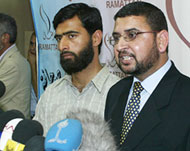Hamas-Abbas discord report denied
A Palestinian official has said the Palestinian president rejected Hamas’s proposed government programme, but Hamas and sources close to Mahmoud Abbas have dismissed the claim.

The senior Palestinian official, asking not be identified, said on Saturday: “[Abbas] rejected the Hamas government programme which was presented to him by prime minister-designate Ismail Haniya because the principal political points in it have to be clear for the international community.”
They also “have to respect the decisions of the Palestine Liberation Organisation and the programme of President Abbas which is based on peace”.
“Negotiations are the way to peace between Israel and the Palestinians.”
Abbas gave Hamas two weeks to change its programme in accordance with his demands, the official said.
Understanding
But later Sami Abu Zuhra, a Hamas spokesman in the Palestinian territories, and Nabil Abu Rudaina, Abbas’s spokesman, both denied the claim.
Abu Zuhra, in an interview with Aljazeera, reaffirmed “the distinct relationship” between Hamas and Abbas.
“Such relationship is based on harmony, understanding and co-operation,” he said.
 |
|
Abu Zuhra (R): There are figures |
He said that there were some figures within the PA who sought to create friction between Hamas and Abbas.
“They keep putting hurdles before the movement in order to hamper its successs in forming a new Palestinian government,” he said.
Abu Zuhra said that Haniya made a telephone call to Abbas to inquire about the reports, which Abbas categorically denied.
Asked to name those who gave statements to the meida, Abu Zuhra said: “It would not be appropriate to give names.
“But I regret to say that several Palestinian leaders do not feel easy with Hamas’s ascendance to power and seek to hamper its progress.”
Efforts continuing
Abu Zuhra denied that Hamas had introduced a political programme to President Abbas.
“The letter submitted by Haniya involved the movement’s acceptance to the designation of forming a new Palestinian government and that efforts are continuing to form a new government as soon as possible,” he said.
|
“[Abbas] rejected the Hamas government programme … because the principal political points in it have to be clear for the international community” Senior Palestinian official |
Izzat al-Rashiq, a member of Hamas, said: “We do not get notified of the positions of Abu Mazin [Abbas] through media sources. When there is something, we are notified officially. Moreover, they have denied this [report] through Nabil Abu Rudaina.”
Under the Palestinian Basic Law, Haniya had three weeks to form a government, with the option of a two-week extension if he more time time to agree a line-up and win parliamentary approval for it.
That would give Haniya until 28 March – the same day as a scheduled general election in Israel.
Farahat Asaad, a spokesman for Hamas in the West Bank, said on Sunday the group would be ready to submit details of the new Palestinian government to the Palestinian Legislative Council before the end of the week.
Hamas will consult all Palestinian blocs and factions with the intention of inviting them to join the new government, Asaad said.
Next cabinet
On 21 February, Abbas invited Haniya to form the next cabinet after the Muslim faction’s massive victory in the Palestinian general election on 25 January.
Since then, Haniya has consulted a number of factions, most notably Abbas’s own Fatah, with which it has not been able to reach agreement on forming a coalition.
Abbas met Haniya on Friday and received a letter from him spelling out Hamas’s proposed programme. No details of the letter were revealed.
Meanwhile, Israel has imposed a ban on all Palestinians by preventing them from entering Israel during the Jewish holiday of Purim as of last Saturday until next Wednesday.
Israeli army officials said the decision was aimed at protecting Israelis during the holiday celebrations.